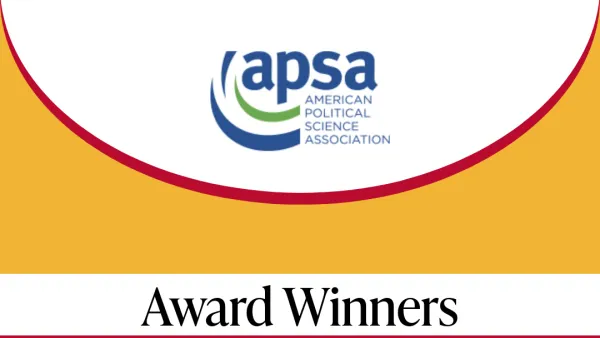James Spriggs is the Sidney W. Souers Professor of Government.
Spriggs' research interests fall broadly within the area of American politics, with a specific focus on judicial politics and empirical legal studies. Much of his research explains the dynamics of appellate court decision making and impact. His research is especially concerned with how institutions (i.e., formal rules or informal norms) shape the choices that judges make. This perspective focuses on how, in attempting to craft law consistent with their preferences, judges are constrained by institutional rules endogenous and exogenous to courts. For instance, his first book (with Paul Wahlbeck and Forrest Maltzman), Crafting Law on the Supreme Court: The Collegial Game (Cambridge University Press) examines how internal rules on the Court encourage Justices to act strategically and bargain, negotiate and compromise. This book is the recipient of two awards from the Law and Courts Section of the American Political Science Association--the first, awarded shortly after the book was published, is the C. Herman Pritchett Award for the best book published on law and courts in a year; and the second honor is the Lasting Contribution Award, given to a piece of scholarship, ten years or older, that has had a lasting contribution on the field of judicial politics.
Based on the research in The Collegial Game, he (with Wahlbeck and Maltzman) created the Supreme Court Opinion Writing Database (located at http://supremecourtopinions.wustl.edu.). This site houses the memos and draft opinions the Justices circulated to one another in the course of writing opinions in cases decided during the Burger Court. The correspondence among the Justices allows one to view in detail how the Justices negotiated with one another over the course of a case's deliberations. The website contains: (1) An electronic dataset with information on each of the 48,524 memoranda and opinion drafts the Justices circulated to their colleagues during the opinion-writing process (e.g, each memo is coded for sender, recipient, and type of memo); and (2) A document archive, with a pdf file containing images of each document in each case. Importantly, the document archive is searchable by Justice's name, case name, type of memo, date, and the like.
Over the last decade or so, Spriggs principally focused on a variety of topics aimed at modeling law and legal development. His second book (with Thomas G. Hansford), The Politics of Precedent on the U.S. Supreme Court (Princeton University Press), provides a comprehensive theory of legal change and couples it with empirical analyses spanning more than 50 years. The theoretical model in the book argues that two variables principally drive legal change: (1) the Justices' policy goals; and (2) an element of the norm of precedent that he terms "legal vitality," which he conceptualizes as the legal authoritativeness of a precedent. Importantly, the theory and empirical results demonstrate the Justices’ ideological goals and the norm of precedent are not mutually exclusive considerations, as is often suggested in the literature. Rather, each of these factors is important as the Justices attempt to set policy that reflects their preferences and encourages the downstream societal effects they desire. His book also speaks to a central debate in the judicial politics literature by showing that precedent can constrain the choices the Justices make. He specifically demonstrates that the Justices respond to the need to legitimize their policy choices by following more legally authoritative cases. This effect is most apparent when considering that the Justices are more likely to positively interpret a precedent they ideologically disfavor if that precedent is particularly legally vital.
In his more recent project, he seeks to understand the changing dynamics (from 1789-2020) of the politics of appointing judges to American lower federal courts (i.e., federal district courts and courts of appeals). The textbook view of the nomination and confirmation of lower federal court judges asserts the process today is fundamentally different than it once was due largely to periodic, structural changes to national party politics or alterations to internal Senate norms. Conventional wisdom, moreover, submits the process was once done quickly and easily because lower federal courts had low visibility and home state senators and presidents cooperated to use appointments for patronage. Additionally, most accounts submit that, until the last few decades, Senators were deferential to presidents, largely acting as a rubber stamp. Over time, the typical account contends, the process became more politicized, ideological, conflictual, time-consuming, and unpredictable. A handful of scholars challenge this conventional account--arguing politics, especially the use of ideology in nominating and appointing lower federal court judges, has always been present. However, few studies offer comprehensive empirical tests of the literature’s claims, with most studies focusing on appointments since the late 1970s; and, the existing studies offer widely-conflicting evidence regarding these issues.
In this project, tentatively titled, Consistency and Change in Appointing Lower Federal Court Judges, he (along with several former and current graduate students, Josh Boston, Patrick Rickert, and Nicholas Waterbury) seek to understand whether, when, how, and by what magnitude national political forces and institutional norms internal to the Senate influence lower court appointments. He is specifically interested in understanding how those forces affect: (1) the likelihood nominees will be confirmed, as well as the length of time it takes the president to nominate someone and the amount of time it takes the Senate to confirm a nominee (where length of time proxies for conflict); and (2) the influence of particular variables (such as Senatorial Courtesy) on the nomination and confirmation process, along with how those forces develop and change over time. Additionally, he aims to ascertain to what degree these forces vary across the district courts and courts of appeals. His principal contribution will be to fathom how and why the appointment process changes over time, and, in so doing, resolve the divergent accounts in the literature.
His articles have appeared in the American Political Science Review, American Journal of Political Science, Journal of Politics, Political Research Quarterly, Law and Society Review, American Politics Quarterly, Perspectives on Politics, Political Analysis, Journal of Empirical Legal Studies, Journal of Law and Courts, Georgetown Law Journal, Emory Law Journal, Washington University in St. Louis Law Review, The Houston Law Review, the Washington University Journal of Law and Policy, and the Illinois Law Review.
He is also the recipient of two National Science Foundation Grants. His most recent NSF grant funds a project that examines the development of the norm of stare decisis in the United States.
Spriggs, an avid angler, combines his passion for fishing and study of politics in a research project being conducted with Professor Nate Monroe (U.C. Merced). Spriggs is interested in the political aspects of the management of inland fisheries in the United States, with an emphasis on the regulatory frameworks used for managing black bass populations. By “politics,” Spriggs means how and why governments decide to allocate scarce resources. In this case, the scarce resources at issue are black bass populations, and the politics involve the way in which state government regulate black bass. Fisheries management may thus be political in two ways. First, the outcomes at issue, the laws and regulations adopted to manage black bass, are inherently political in that they are allocative and determine who gets what, when, and how. Second, the process by which management agencies promulgate regulations may or may not be political. Our study aims to uncover whether, to what degree, and under what conditions political forces influence fisheries management, as opposed to non-political factors, such as scientific information.
Black bass, which now exists in 49 states (largemouth are indigenous to 42 states and smallmouth to seven), are the most sought after game fish in America, and states have long attempted to protect them from overfishing and habitat degradation. There is an extensive body of literature by biologists that provides considerable information concerning which factors improve fish populations (and thus which regulations are appropriate for different bodies of water); and there is a smaller body of literature, using the tools of social science, that focuses on anglers' preferences for different management practices, satisfaction with fishing, fishing proclivities, and the like. In addition, there is a modest-sized literature that discusses how marine fisheries management involves political considerations. However, there is virtually no social science research examining the political element in inland fisheries management (i.e., the role of anglers, organized interests, bureaucrats, and elected politicians in creating and enforcing regulations).
The basic research puzzles Spriggs’ addresses in this project are the following: how do states decide which regulations to adopt to manage black bass populations (which means explaining variation in regulatory approaches over time in a given state and across states at a given point in time); and, once adopted, why are some regulations more successful than others? Most of the existing literature on managing black bass thinks in terms of determining which regulations are optimal, given biological science or even social factors, such as angler attitudes toward alternative regulations. Political Science, however, emphasizes there are obstacles to choosing optimal policies based on what is politically feasible. Inland fisheries management, in other words, like any regulatory endeavor, may not always be driven by concerns about science and optimal policy but instead be influenced by political factors.
One of the principal lessons from Political Science in the past few decades is that institutional rules (the formal and informal rules of the political process) influence outcomes. Using this idea, we intend to examine whether and how variation in decision-making rules across states or within a state over time influences the regulation of inland fisheries. Examples of variation in institutional rules regarding management of inland fisheries include: how agency directors are selected, how management agencies are overseen by the legislature or governor, and the source of funding for management agencies. He will also examine the role organized interests (e.g., B.A.S.S, American Fisheries Society, or Cabela's) play in the adoption and effectiveness of various management practices. By understanding the connection between anglers, interest groups, and the government officials responsible for managing inland fisheries, Spriggs hopes his research will improve the regulatory process and, as a consequence, protect and enhance the health of this natural resource. Put simply, this project seeks to demonstrate that the effective regulation of inland fisheries requires an understanding of politics.
In the first working study from this project, he, along with Nate Monroe, and two fisheries biologists—Greg Sass and Michael Allen—are using survey experiments to determine how management agencies can alter anglers’ attitudes toward catch and release and selective harvest. Anglers on some bodies of water (e.g., those with high recruitment, many small to medium-sized fish and not enough food) are not harvesting enough fish, causing suboptimal population structures. Management agencies thus need anglers, who often hold very strong preferences for catch and release, to harvest more fish. But, how can agencies alter strongly-held beliefs that catch and release is necessary for a healthy fish population? This paper will answer that question and help state agencies better manage anglers and fish.


